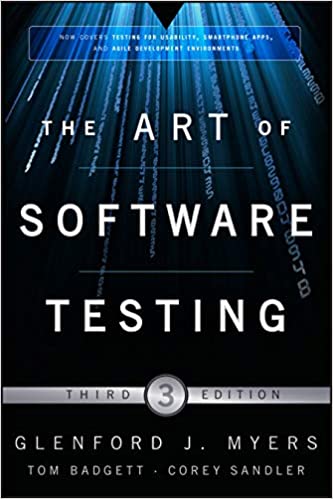Testing, as any other discipline, requires continuous learning.
If you want to do your job better, or want to make a career in software testing, you need to invest some of your time and money to increase your knowledge.
Today there are lots of possibilities to help us learn: training courses, conferences, books, magazines, blogs and other online offerings.
In-person training courses and conferences are probably one of the best ways to learn, to develop skills, to share expertise and to explore new things. But during this pandemic they were limited and,generally speaking, they are not cheap.
Books, on the other hand, have the best cost-benefit ratio! You can learn from the most successful testing and automation experts directly in your hand at an affordable price.
Reading a well written book is one of our favorite ways to discover new ideas, concepts, and upgrade our knowledge in new testing areas.
In this article, we have drawn a small list of 5 software testing books we think you should have on your bookshelf. These books are both for beginners as well as experienced testing professionals.
——
1. The Art of Software Testing (3rd Edition) – Glenford J. Myers
This is probably the first book all of us have read to start working in software testing.
This edition is the 3rd revision of the 1979 classic that influenced several generations of testers. It provides a brief but general and practical presentation of many time-proven software testing techniques.
The book starts with an evergreen discussion of the nature and aims of software testing, including psychological, economic, and managerial aspects.
Myers describes the latest methodologies for the design of effective test cases through the software development life cycle, from Unit to Higher-Order testing.
This edition also includes modern trends like Web Testing, testing in the Agile environment, and mobile application testing on different devices.
2. Software Testing Techniques (2nd edition) – Boris Beizer
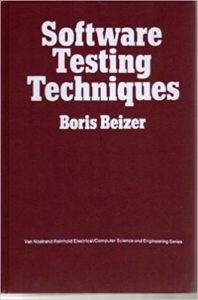
If The Art of Software Testing was the first book we read, this is the second.
With this work, Beizer made testing a well-defined “technical discipline” with a lot of very strong techniques and tools. The author gives a comprehensive overview of software testing emphasizing on formal models.
Even if some contents were now outdated, the great merit of this book is that it explicitly addresses the always modern idea that design for testability is as important as testing itself.
3. Lessons Learned in Software Testing: A Context-Driven Approach – Cem Kaner, James Bach and Bret Pettichord
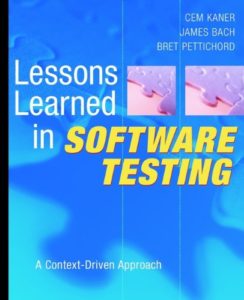
In a nutshell an adjective: “practical”!
The book is built as a series of short, easily readable descriptions of 293 lessons learned in software testing, including (but not limited to) test design, test automation, test management, testing strategies, and bug reporting.
There is a testing lesson for almost every situation.
Each lesson is an ‘assertion’ related to a testing aspect, followed by an explanation or practical example showing you the how, who, when, and why of the testing lesson.
This work distills useful practices and helpful ways of evaluating and managing situations to reach your objectives .
If you are somewhat an experienced tester, you should buy this book.
4. Agile Testing: A Practical Guide for Testers and Agile Teams – Lisa Crispin and Janet Gregory
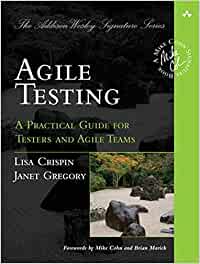
Agile is very popular these days. But What Is Agile Testing? Who is an Agile Tester?
This practical book tries to answer these and many other questions to guide testers and managers in transitioning to agile.
Crispin and Gregory define agile testing and illustrate the tester’s role, the cultural and organizational challenges, how to use the Brian Marick’s Agile Testing Quadrants to identify what type of testing is needed, who should do it, and what tools might help.
5. A Journey through Test Automation Patterns: One team’s adventures with the Test Automation Patterns wiki – Dorothy Graham and Seretta Gamba
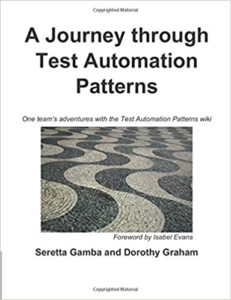
The authors stated: “This is a story – based on real patterns of behaviour we have observed – about a software test automator and her struggles to implement good automation in her company.”
The book aims at being a sort of Rosetta stone for developing testing automation. It uses in a very practical way the patterns the authors collected in the wiki TestAutomationPatterns.org, during their job experiences, to face realistic situations and improve any automation issue you might find yourself in.
“Things are never as straight-forward as we hope, and this book shows a number of things that go wrong, as well as many things that go well.”
The book is very good! For sure it is one of the best books on the market on this subject.
——
Of course, this is “our” list of books! You might have completely different lists of books from which you draw inspiration.
We do not expect our list to be exhaustive or final – we just want to create a room for discussion. Enjoy.


